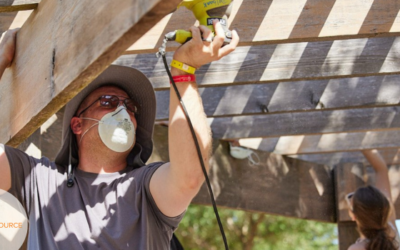Download a printable PDF of the talk sheet But God Said No More Floods.
Part of Why? A Resource Kit for Talking to Students about Disaster, Relief, & Restoration.
Core Text: Genesis 9:8-17
Core Visual/Illustration: Bring two bowls of water. Make one a beautiful glass or crystal bowl of clear water. Fill this bowl at the time of the class from a bottle (or two) of bottled water. The other bowl should be a “working” bowl, an old plastic or ceramic bowl that’s seen some hard work. Have it filled with tap water. (Having the water a little cloudy would be helpful) Bring a bottle of dishwashing detergent also. A couple of dishes in need of washing would also help.
Major Teaching Points: Water can be used by God for many purposes.
Teaching Point #1
Water is one of the prime beginning points of God’s creation. Genesis 1:2 has the Spirit hovering over the waters. Water is the working substance of much of God’s creation and continues to be essential for and within us. While the recent floods have made water seem a danger, we might think of it as a place of God’s work. (Set out the working bowl with tap water).
Teaching Point #2
Water is also the workplace of God when it is churning and washing. This was the work of Noah’s Flood, which washed the world. (Add the dishwashing detergent, work up the suds, and start washing the dishes.) The water churns and swallows up what’s being washed. We see some of this same churning and swallowing in the recent floods. However, a key difference is that the Flood of Noah was specifically sent due to the sins of the world, Genesis 6:5-8. We can’t say the same about the floods since then. Rather, they are similar to the disasters Jesus mentioned in Luke 13:1-5. He teaches that those who were killed by the soldiers or by the falling of a tower were not worse sinners than others who were spared. So those who died in the floods were not specifically being chastised for a greater sinfulness than those who were safe.
Teaching Point #3
Water can also be the beautiful ending of God’s work. (Here pour out the bottled water into the crystal bowl.) This water is sparkling and even a bit expensive. If we hold water to the light just right, it becomes a prism. This is the work of the rainbow in Genesis 9:8-17. God amazingly takes the water of the Flood, dirty and terrifying, and turns it into a beautiful sign. We can’t turn the sudsy, dirty water of the one bowl into the pure, sparkling water in the crystal. However, God does this. For Noah, water in the heavens became an assurance of God’s mercy. For us, water is the assurance and power of his grace through baptism. 1 Peter 3:18-21 reminds us that the water of Noah points to the water of baptism which now saves us.
Teaching Point #4
Here is a helpful quote from the Lutheran Confessions, which addresses the work of God through evil:
God’s foreknowledge sees and knows in advance the evil as well, but not in such a way as though it were God’s gracious will that it should happen. To be sure, he sees and knows beforehand whatever the perverse and wicked will of the devil and of men will attempt and do. But even in wicked acts and works God’s foreknowledge operates in such a way that God sets a limit and measure for the evil which he does not will—how far it is to go, how long it is to endure, and when and how he will interfere with it and punish it. For the Lord God governs everything in such a way that it must redound to the glory of his divine name and the salvation of his elect, and thereby the ungodly are confounded. The source and cause of evil is not God’s foreknowledge since God neither creates nor works evil, nor does he help it along and promote it, but rather the wicked and perverse will of the devil and of men. Lutheran Confessions, Formula of Concord, Solid Declaration, XI
Questions/Discussion Starters for Youth:
- While floods and hurricanes have made water a frightening power, when has water been beautiful or, at least, useful?
- Read Luke 13:1-5. Why is it important to recognize that those disasters that strike a town or certain group are not necessarily punishment for a particular sin?
- We can’t change filthy water, dishwater or storm waters, into pure, life giving water, but God can. How is the rainbow a symbol of this? How does baptism’s water do this for us daily?
- The quotation from the Lutheran Confessions says that God is not the cause of evil, but He controls it. How might this be a foundation for our understanding of the recent floods? To what degree are these disasters and sufferings not the wish of God? How does He limit the evil which He doesn’t cause? And, finally, how does God transform the evil into a good purpose for his people?






0 Comments